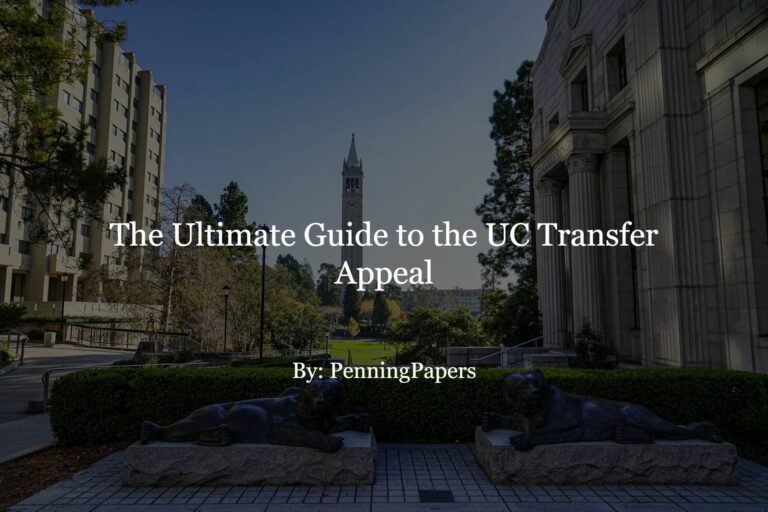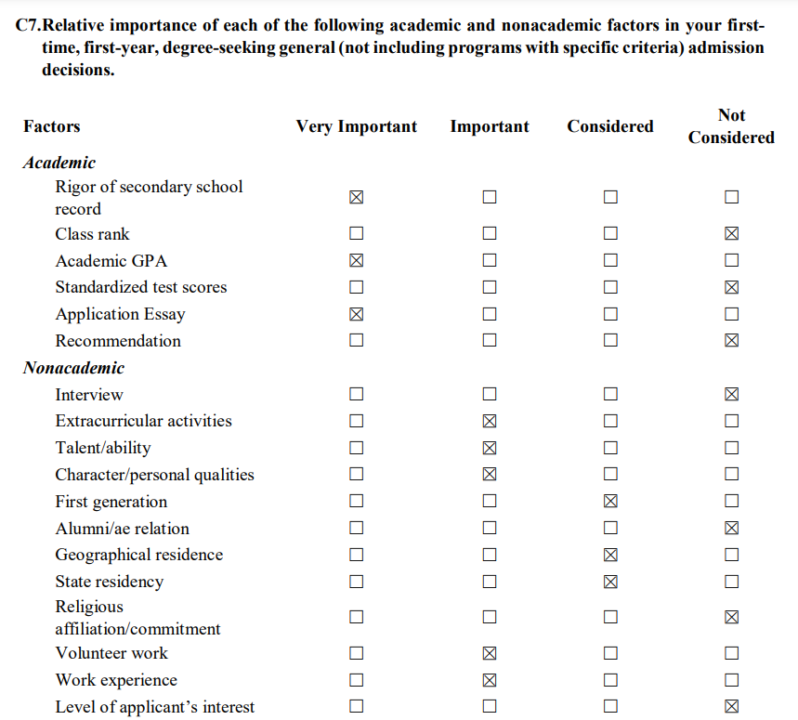If you’re looking to complete a UC transfer appeal, you’re in luck.
We created this comprehensive guide to help you understand how the transfer appeal works. And, we’ve also covered important points about the UC transfer appeal letter.
This advice is based on many years of experience working with out clients. We’ve helped a good number of students get accepted via appeal to some of the best UC schools with the smallest acceptance rates, including UCI, UCSD, UCLA, and UCB.
So, know you’re in good hands!
Table of Content
- Important Points to Know About the UC Transfer Appeal Process
- How Does the Transfer Appeal Process Work for University of California Schools?
- Will I Get in Trouble for Withdrawing My UC SIR After Getting Accepted From Appeal Elsewhere?
- Can I Appeal While on the Waitlist?
- What are the University of California Transfer Appeal Acceptance Rates?
- Is a UC Transfer Rejection Worth Appealing?
- How to Write the UC Transfer Appeal Letter
- UC Transfer Appeal Letter Instructions
- What Should I Write About in My UC Transfer Appeal Letter?
- Does My Topic Count as “New and Compelling?”
- You Need to Explain WHY Your New Information is Compelling.
- Can I Submit a UC Appeal if I Have an Update?
- Why Transparency, Humility, and Honesty are so Important.
- What if I Don’t Have Anything to Write About in My UC Transfer Appeal Letter?
Professional College Application Help.
Contact us. We'll get to you within 24 hours.
1. Important Points to Know About the UC Transfer Appeal Process

How Does the Transfer Appeal Process Work for University of California Schools?
If you’re rejected by a UC campus, they often will accept an application for appeal. This means exactly what you’re thinking. You can “reverse” your rejection, get accepted despite initially being denied, and attend the school of your dreams.
Each UC campus has their own unique set of transfer appeal instructions. You can often find them in the bottom of your rejection letter.
For most UC campuses, the transfer appeal deadline is on May 15. But, this does not apply to all campuses. For instance, UCR and UCLA have transfer appeal deadlines of May 15. But, UCSD’s deadline is May 12.
Most campuses will notify you of your transfer appeal decision after the June 1 SIR deadline.
Will I Get in Trouble for Withdrawing My UC SIR After Getting Accepted From Appeal Elsewhere?
Nope!
Again, most campuses send decisions after June 1. If you send a UC SIR to one school, but withdraw to attend another UC campus that accepted you via appeal, you’ll be fine!
Just, kiss your non-refundable $250.00 deposit goodbye!
Can I Appeal While on the Waitlist?
Nope!
Most UC campuses don’t allow waitlisted students to appeal.
However, some UC schools may provide exceptions. The waitlist and appeal process is not as formal as the regular and transfer admissions process. They’re often considered afterthoughts of the process. So, the rules can be iffy.
Confirm with your local UC admissions officer to keep up to date with the latest instructions and changes.
Note: while some campuses allow you to appeal if you decline a spot on the waitlist, this is often a bad idea. Waitlists typically have a significantly higher chance of acceptance than appeals. And, waitlists demonstrate admissions officers have considered your application strong enough to warrant consideration, not outright denial.
What are the University of California Transfer Appeal Acceptance Rates?
All information regarding UC transfer appeal statistics can be found in the Ensuring Transfer Success (ETS) page. Simply scroll to the latest year’s link titled, “UCOP and campus updates.” You should see a slideshow containing all the UC campuses and their transfer stats. Below we’ve pasted an example containing Berkeley’s transfer appeal stats.
For your convenience, we’ve listed transfer appeal acceptance rates for all UC campuses below.
| Campus Name | Students Admitted via Transfer Appeal | Transfer Appeal Rate |
| UCB | 8/199 | 4.02% |
| UCLA | 18/381 | 4.72% |
| UCSD | N/A | N/A |
| UCSB | N/A | N/A |
| UCI | 13/332 | 3.92% |
| UCD | N/A | N/A |
| UCSC | N/A | N/A |
| UCR | 58/169 | 34.32% |
| UCM | N/A | N/A |
Note: many campuses did NOT include their transfer appeal rate. Nonetheless, you can see how dismal the acceptance rates are. UCI, UCLA, and UCB have single digit appeal acceptance rates.
However, UC Riverside stands out as an outlier, with a whopping 34.32% acceptance rate.
Is a UC Transfer Rejection Worth Appealing?
Yes, it is almost always worth sending an appeal for a UC transfer rejection.
In fact, it’s worth appealing a rejection whether you’re a transfer or first-year applicant. Even if you’re rejected by a hard campus like UCLA and rejected for a competitive major, it’s worth appealing.
Under practically all instances, sending an appeal is worth it.
Think of it from a Risk Management perspective. When we work with our clients on their UC appeal letters, it typically takes 4-5 hours to finish an appeal from start to finish. Students with existing drafts who don’t require brainstorming sometimes need fewer hours. The time commitment made to craft a solid appeal letter is very small. Now, while the UC Transfer appeal rate can be dismally small, it’s worth it! 4-5 hours for a fraction of a chance at reversing your rejection is an infinitesimally small price to pay for a second chance.
The cost-benefit-analysis of sending an appeal letter is heavily in your favor —regardless of the low acceptance rate!
Oh, and if you’re a Millennial or Gen Z, you likely spend 4-6 hours per day anyway on your phone. You can quite literally sacrifice a day of Instagram Reels, TikToks, and YouTube shorts to craft a solid, winning appeal letter. Not spending that time for the second chance at acceptance —regardless of how small— is mathematically asinine.
2. How to Write the UC Transfer Appeal Letter

UC Transfer Appeal Letter Instructions
If any UC schools rejected your application for transfer, don’t worry; you can still get accepted by writing a compelling UC transfer appeal letter.
But, we’re going to be quite honest. It’s not easy.
For, a strong UC transfer appeal letter must stand out from the rest of the application pool. And you can be certain many students will appeal their decision with a vengeance!
In fact, plenty of students with strong and compelling information in their appeal letters get rejected. That’s why it’s especially crucial to write a strong appeal letter that cuts through the rest of the competition.
Most UC schools ask for the same thing for all their transfer appeal letters. They want “new or compelling information that proves you’re a much stronger candidate than originally expected. This does NOT mean information that is recent or after the original application was submitted.
However, there are exceptions where fascinating or incredibly compelling new information makes a student a priceless asset. We’ve had students who presented such fascinating information despite it taking place after their application was submitted. And, they were accepted. But, this only qualifies for the 1% of the 1% of students. If you’re not sure if your topic qualifies for the UC transfer appeal process, consider speaking with us for additional guidance.
Depending on the appeal letter’s word count, you may be limited in what you can include. So, it’s best to be short and sweet with your words. Don’t be verbose, and don’t rely on strong imagery; for, it’ll only take up space from other points you can make.
What Should I Write About in My UC Transfer Appeal Letter?
While each UC campus has their own unique instructions, most UC transfer appeal letters require you to provide new or compelling information that warrants appeal. This can include but is not limited to the following items.
- Explanations of academic performance (low performance)
- Extracurriculars not explained in the application.
- Unusual circumstances or emergencies that provide additional context to your application.
- Glitches, mistakes, and other abnormalities with your transcript or application.
- Experiences outside of academics such as personal projects like YouTube channels, art projects, or non-profit initiatives that demonstrate interesting or compelling experience.
Topic-wise, the UC transfer appeal letter is likely no different than what you’d see in a UC freshman appeal letter.
A great way to figure out what to write about for your UC transfer appeal letter is to think about what got you rejected. Simply look at your chosen UC school’s Common Data Set, note which factors they consider important, and measure which factor you fell short in. Then, write about that.
For instance if your previous application essay was written poorly and your chosen UC campus weighs the UC PIQs very heavily, write about what made writing the UC PIQs perfectly an improbability.
Below we’ve provided an example of UCLA’s Common Data Set.
For more information, check out section 2.1 and 2.2 of our UCLA appeal guide.
Now, while it’s impossible to figure out “why you got rejected” without getting into crystal-ball mysticism, don’t worry. You can generally extrapolate from the weaknesses in your application why you were rejected. Of course, if your application seemed strong in every aspect and you can’t figure out what went wrong, consider speaking with us. We can help audit your application to determine what likely went wrong, and give you general UC transfer appeal letter writing advice from there!
Does My Topic Count as “New and Compelling?”
For a UC transfer appeal letter to have merit, it must provide “new and compelling” information. Let’s define this in depth below.
New information includes details that weren’t shared in your original application at all. This can include extracurriculars you’ve forgotten to add, leadership titles you left out, personal projects you excluded, and more. Additionally, it can include information that qualifies existing topics in your initial application. For instance, you may have discussed , or supplementary information that qualifies your existing
Compelling information is anything that would reshape the way admissions officers look at your original application. For instance, you may have failed to mention your family health issues. They could have taken time away from your academics, making your high GPA much more impressive than originally expected. This may make you a great candidate and compelling as a prospective student, as it demonstrates strong academic prowess and rigor.
However, one should be wary of what is considered compelling. Some topics may be considered more compelling than others depending on the admissions officer reading your letter. Some may value financial hardships more than learning disorders. Others may weigh family dysfunction very heavily. It all depends!
As mentioned in the bottom half of section 2a of this article: there are instances when topics are not new. But, they still are significant and compelling enough to warrant appeal. Admissions officers can be more flexible with things than you expect. Your topic may still be viable even if it’s not technically “new.” However, this applies to the 1% of the 1% of students.
You Need to Explain WHY Your New Information is Compelling.
This is one of the most important points to crafting a winning UC transfer appeal letter. You MUST explain WHY your new information is compelling.
Admissions officers aren’t mind readers. They can’t just look at the context and immediately connect all the dots. Sure, they may be capable of inference and extrapolation.
But, it’s your job to explain in detail WHY the new information matters. That is, why does it change how your original application looks like? And, why does that make you a solid candidate?
Let’s take a look at the “family health issues” topic again as an example.
If you appeal to a UC campus by saying you failed to mention your family’s health issues, that CAN’T stand on it’s own. You need to explain why family health issues would add new context to your original application. Did they have severe conditions that made earning a high GPA harder? Perhaps they took a lot of time out of your hands to the point where certain plans and projects fell short! After all, family health issues can often feel like second jobs!
It’s crucial that you explain the reason why the new information is compelling. It should help admissions officers reshape their understanding of your original application.
Can I Submit a UC Appeal if I Have an Update?
Generally: no.
However, it’s not so cut and dry. After all, the admissions process is prone to unusual circumstances that lead to gray areas.
While updates after your application submission normally isn’t grounds for appeal, the University of California can sometimes be flexible.
For instance, we helped many students successfully appeal to multiple UC campuses using updates. In particular, many had undiagnosed ADHD that was not discovered until after their application submission. While this is an update and normally not grounds for appeal, it provides extra context to their GPA, extracurriculars, and hardships in essay topics —weighing their achievements more heavily.
The key here is that they could NOT have known of their condition until after submission. So, there was no reasonable action they could have taken to truly contextualize their application —as they weren’t diagnosed yet.
Again, not everyone has ADHD. And, only a small fraction of students have updates after their application that would persuade admissions officers to be lenient with the rules.
If you’re unsure of whether your UC transfer appeal letter topic qualifies, consider speaking with our admissions experts for a free consultation. This stuff gets complicated; so, it helps to hear from a professional opinion!
Why Transparency, Humility, and Honesty are so Important.
When writing the UC transfer appeal letter, it’s vital to be transparent, humble, and honest. This is because most college students bend and twist their words in their letters.
Why? Well, students often feel nervous and anxious. When the the chances of acceptance are so slim, it’s tempting to bend the truth in your favor —or outright lie— to boost your chances of acceptance. It’s a false presumption that one may control their admissions decision by being sneaky with words.
Here’s a tip for those looking to white lie their way through the appeal letter. It won’t work.
UC admissions processes take careful time and dedication before truly making a decision. And, you can bet that the appeals process —especially with how many students lie and grasp for straws in it— will be treated with much scrutiny and careful attention.
That’s why your best bet is to predicate your appeal on the truth. Speak the truth, and nothing but the truth. By being openly transparent, humble with your mistakes, and honest, your character will shine past the rest of the admissions pool. And, you’ll prove to admissions officers that they can trust you.
What if I Don’t Have Anything to Write About in My UC Transfer Appeal Letter?
Now, the worst case scenario is you have nothing to write about. Don’t worry. You can still write an appeal.
First, most students have more valid reasons for appeal than they expect.
Second, while UC transfer appeal essays don’t let you repeat the same points mentioned before, you can still qualify said points. Adding extra context to grades, extracurriculars, projects, etc is fine so long as it provides a new perspective. For instance, you explain how a sports injury you discussed in your UC PIQs led to other unmentioned problems.
Maybe it left a financial burden on your family that you needed to supplement with work. Or, it took time away from studying which made earning your grades more impressive than originally expected. As you’re adding content to your existing points instead of repeating, you’ll be fine!
Lastly, there are “generous years” when many students are accepted via appeal.
Why? Well… quotas!
They may need more women in mechanical engineering or higher international student rates. Sometimes it’s to balance yield. That’s why some students students with poorly-written UC transfer appeal letters with invalid reasons still get accepted. So, even without a good reason for appeal, send a letter anyway! You never know when your year will be generous! For more information, refer to our explanation on appeal processes in our UT Austin appeal article.
Note: UC schools often utilize their waitlist process to fulfill their admissions quotas. So, your chances of acceptance via appeal is much slimmer than through waitlist.
If you’re still feeling lost when approaching the UC transfer appeal process, don’t worry. We’ve got your back. Schedule a free consultation with us today, and we’ll get back to you within 24 hours. We’ve helped countless students like yourself get accepted off waitlists and appeals to schools like UCB, UCLA, and more.



